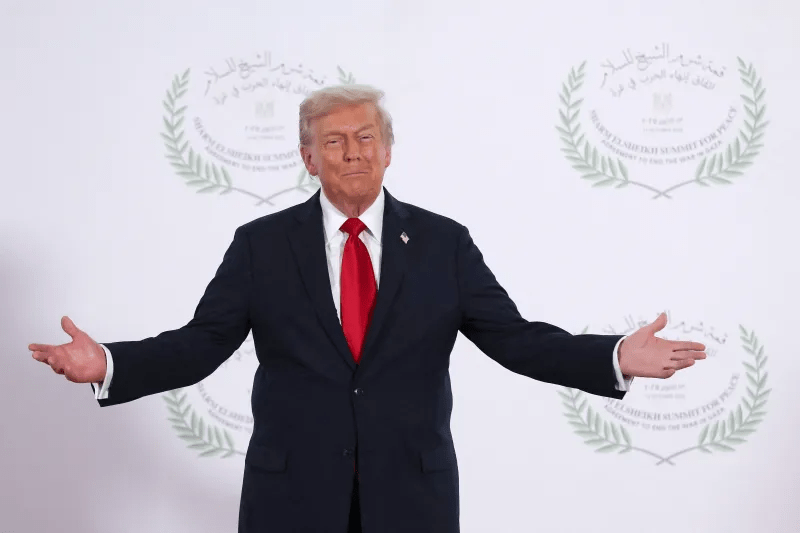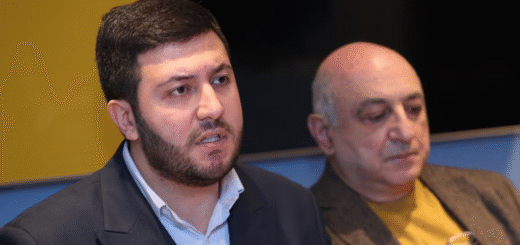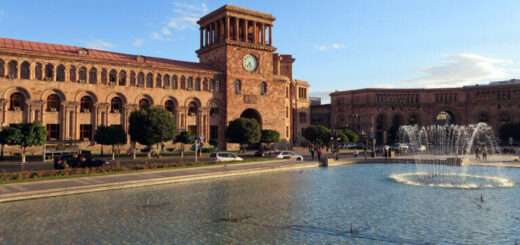A Perpetrator’s Peace

U.S. President Donald Trump poses for a photo in during a summit on ending the Gaza war Sharm el-Sheikh, Egypt, on Oct. 13. SUZANNE PLUNKETT – POOL / GETTY IMAGES.
From Nagorno-Karabakh to Gaza, Trump’s approach to conflict resolution has rewarded aggression and perpetuated ethnic cleansing.
By Henry Theriault, a former president of the International Association of Genocide Scholars (2017-2021), and Alex Galitsky, the policy director of the Armenian National Committee of America in Washington.
Foreignpolicy.com
From Gaza to Nagorno-Karabakh, U.S. President Donald Trump claims to have resolved some of the world’s most intractable conflicts in a matter of months with his made-for-TV peace plans. Many seasoned observers have warned that these agreements are less than they seem. They are incomplete and deeply asymmetric, with implementation largely reliant on the magnanimity of the victors.
But that only begins to capture what is so dangerous about them. In prioritizing spectacle over substance in his ill-fated bid to secure a Nobel Peace Prize, Trump’s peacemaking has only served to consolidate genocidal gains while further disenfranchising victims. In doing so, he has rehabilitated a “victor’s peace” model of conflict resolution that will undermine peacemaking globally.
Nowhere is this more apparent than in recent reports that Azerbaijan is under consideration to lead the international stabilization force (ISF) in Gaza—the multilateral body that would oversee security and cease-fire monitoring as part of Trump’s peace plan. It is difficult to imagine a worse country for this role. Only two years ago, Azerbaijan forcibly displaced the entire Armenian population of the Nagorno-Karabakh region by means of blockade, starvation, and military force—measures that the International Association of Genocide Scholars have described as genocidal.
Whether or not Azerbaijan ends up playing a role in the ISF, Trump’s approach has already abandoned the Palestinians of Gaza, like the Armenians of Nagorno-Karabakh, to the mercy of those who seek to destroy them.
FOLLOWING A MILITARY victory against Armenian forces in 2020, Azerbaijan imposed a blockade against the Armenian population of Nagorno-Karabakh in December 2022. For the next 10 months, Azerbaijan deprived the region’s 150,000 Armenians of food, fuel, medicine, and other essential humanitarian goods before launching a military assault that resulted in the ethnic cleansing of its entire Armenian population.
To this day, Azerbaijan continues to unlawfully detain and abuse dozens of Armenian prisoners of war and former political leaders—while engaging in the systematic destruction of Armenian cultural heritage and civilian property. This is all part of an attempt to deny Armenians the right to return to their homes by leaving them with nothing to return to.
The idea of putting one genocide perpetrator in charge of peacekeeping in the aftermath of another genocide is repugnant. But the situation is made even worse by the deep military and economic collusion between Israel and Azerbaijan. Indeed, Azerbaijan’s war in Nagorno-Karabakh served as a testing ground for the weapons, tactics, and methods that Israel later deployed against Gaza’s Palestinians. Between 2016 and 2020, Israel accounted for nearly 70 percent of Azerbaijan’s arms imports. This proved to be a decisive factor in Azerbaijan’s 2020 military campaign, which set the stage for the ethnic cleansing in 2023. Azerbaijan, in turn, supplies Israel with 40 percent of its oil imports, making it an indispensable energy partner.
That Azerbaijan could be considered for a role in Gaza despite all this lays bare the distorted logic behind Trump’s approach to conflict resolution. Justice and accountability have been divorced from the concept of peace, which has become simply a means of securing geopolitical and even financial ends.
Azerbaijan’s own fraught peace process with Armenia has been widely rebuked for failing to provide any measure of justice for the victims of the former’s aggression. Despite paying lip service to peace, Azerbaijan continues to occupy portions of sovereign Armenian territory along the border and seeks to use its military advantage to impose maximalist demands.
As a result, Azerbaijan has been able to dramatically move the goalposts of negotiations. For decades, the peace talks overseen by the Organization for Security and Cooperation’s Minsk Group sought to prioritize the right to self-determination for Nagorno-Karabakh’s Armenians. But Azerbaijan is now ransacking and demolishing towns once populated by Armenians and solicting foreign investment for the redevelopment and resettlement of the region. As a result, it is clear Baku has no interest in allowing for the return of Armenians to their homes, let alone granting them even the most limited autonomy.
In fact, Azerbaijan struck a symbolic death blow against the principle of self-determination by demanding the dissolution of the OSCE Minsk Group as a prerequisite for peace—a move that was finalized during a trilateral meeting with Trump at the White House in August.
In addition to imposing its terms through the threat and use of force, Azerbaijan has also successfully denied Nagorno-Karabakh’s Armenians a seat at the negotiating table by arresting the region’s former leaders and its onetime interlocutors. Those officials now face show trials on politicized charges. They have been subject to abuse and mistreatment, deprived of their legal rights, and denied access to the International Red Cross.
And in a further mockery of this peace process, Azerbaijan has refused to guarantee the release of these officials—or the roughly dozen other Armenian prisoners of war and captives in its detention—as part of a final deal. In its attempt to evade accountability, Azerbaijan has also insisted that Armenia withdraw its international human rights complaints against Azerbaijan before international courts as part of the agreement. Many of these cases had already seen provisional judgements in Armenia’s favor, such as the International Court of Justice ordering Azerbaijan to comply with humanitarian law in its treatment of detainees and ensure the expedited, safe, and voluntary return of displaced Armenians to Nagorno-Karabakh.
Perhaps most egregious, however, is the proposed “Trump Route for International Peace and Prosperity,” which would grant the United States exclusive development and operational rights over transportation and communication networks in Armenia’s southern province of Syunik to allow uninterrupted commercial transit between Turkey and Azerbaijan. Azerbaijan and Turkey have long coveted access to what they refer to as the “Zangezur corridor” to monopolize the flow of energy and resources through the middle corridor connecting Central Asia to Europe.
What Azerbaijan once sought to secure through force has now been awarded to it through Trump’s intervention—in an effort to secure a U.S. foothold in the region while preventing Russia, Iran, and China from dominating this global crossroad. In the process, Armenia has been treated as little more than collateral damage—a necessary sacrifice at the altar of regional energy politics.
THE PICTURE IS no less grim for the Palestinian people, who have also been denied any real agency in a peace process that will determine their future. There are clear similarities between these so-called peace processes. Both agreements have prioritized the symbolism of signatures on paper over a comprehensive approach to resolving more contentious and fundamental issues.
For Armenia, this includes the unresolved status of Armenian detainees, the fate of Nagorno-Karabakh’s Armenian heritage, the security and sovereignty of southern Armenia, and the prospects of a safe and secure return for forcibly displaced populations. For Palestinians, it involves the future of Palestinian sovereignty, the possibility of return for displaced populations, the status of Jerusalem, and the ongoing occupation and apartheid in the West Bank.
In many ways, “peace” in this context merely freezes the intolerable underlying conditions of oppression that Armenians and Palestinians have been suffering—and which Trump’s plans bring us no closer to addressing.
Rather than ensuring robust international security guarantees, the agreements both rely heavily on the misplaced belief that regional investment, development projects, and trade will serve to incentivize peace and deter renewed escalation. But this is pure fantasy. Both Azerbaijan and Israel are already hubs of regional trade and investment, a fact that has done nothing to deter their adventurism.
Instead, deepening economic entanglements and mutual dependencies have only made it more difficult and costly to hold these countries accountable—while rewarding and normalizing military aggression. As a result of this absence of any real accountability, oversight, or security guarantees, the fates of the Palestinian and Armenian people have been left to the discretion of their oppressors.
These agreements also represent a complete abandonment of transitional justice. Where truth and reconciliation commissions and international war crimes tribunals were once considered the cornerstones of conflict resolution—particularly in the aftermath of genocide—these elements have not only been sidelined but also explicitly delegitimized. The efforts of both the United States and Israel to discredit international courts, and Azerbaijan’s successful bid to force Armenia to withdraw active human rights cases, have irreparably undermined the status of international humanitarian law and international human rights law.
Even measured against the admittedly modest successes of the international criminal tribunals for the former Yugoslavia and Rwanda as well as the truth commissions for South Africa, Sierra Leone, Guatemala, Argentina, Canada, and elsewhere, the peace processes under consideration here fall drastically short. For both Gaza and Nagorno-Karabakh, justice and accountability have been treated as an inconvenience—obstacles to reaping the supposed economic dividends of peace.
This has perversely led to the emergence of “peacewashing,” where performative peacemaking has served to obfuscate behavior that is otherwise incompatible with peace. Azerbaijan has become incredibly proficient at using public spectacles and ceremonies to whitewash its public image: It has “sportswashed” its egregious human rights record by regularly hosting international events such as Formula 1 racing and UFC matches, and it “greenwashed” its fossil-fueled atrocities by hosting the COP29 climate summit last year. Azerbaijan’s proposed participation in the ISF is peacewashing par excellence—portraying itself as good-faith partner for peace in Gaza while consolidating its military subjugation of Nagorno-Karabakh.
But peacewashing is not just limited to perpetrators: International guarantors also use the optics of peace to get a piece of the action in the form of lucrative post-conflict reconstruction and development deals. By reducing peace to a marketing stunt for reputation laundering by war criminals and their enablers, these agreements set a dangerous precedent that will cast a shadow over efforts to mediate other global conflicts.
There is no better recipe for renewed violence than an unjust peace. When states are rewarded for their violations of international law, it legitimizes the use of violent military force as an alternative to negotiation. And when victim groups are denied justice or restitution for the crimes that they’ve suffered, it only serves to reify and reinforce the intolerable conditions of oppression that produced violence in the first place.
By putting spectacle before substance, Trump’s peace deals are set up for failure. When you reduce decades-long conflicts rooted in subjugation and genocide to mere territorial disputes, it is perhaps understandable that the proposed solutions resemble land development deals. But neither the proposed “Trump corridor” nor the “Gaza Riviera” offer much in the way of solace for the communities whose lives have been irreparably scarred by violence—and who have once again been denied a real seat at the table that will decide their future.
In eschewing justice and accountability and neglecting the root causes of these conflicts, these Potemkin peace plans risk returning us to a model of conflict resolution where might makes right and to the genocidaire go the spoils.
——————————
Henry Theriault is a former president of the International Association of Genocide Scholars (2017-2021) and the associate provost at Worcester State University. The views expressed in this piece are not official views of Worcester State University.
Alex Galitsky
is the policy director of the Armenian National Committee of America in Washington, the largest Armenian-American grassroots advocacy organization in the United States. X: @algalitsky





